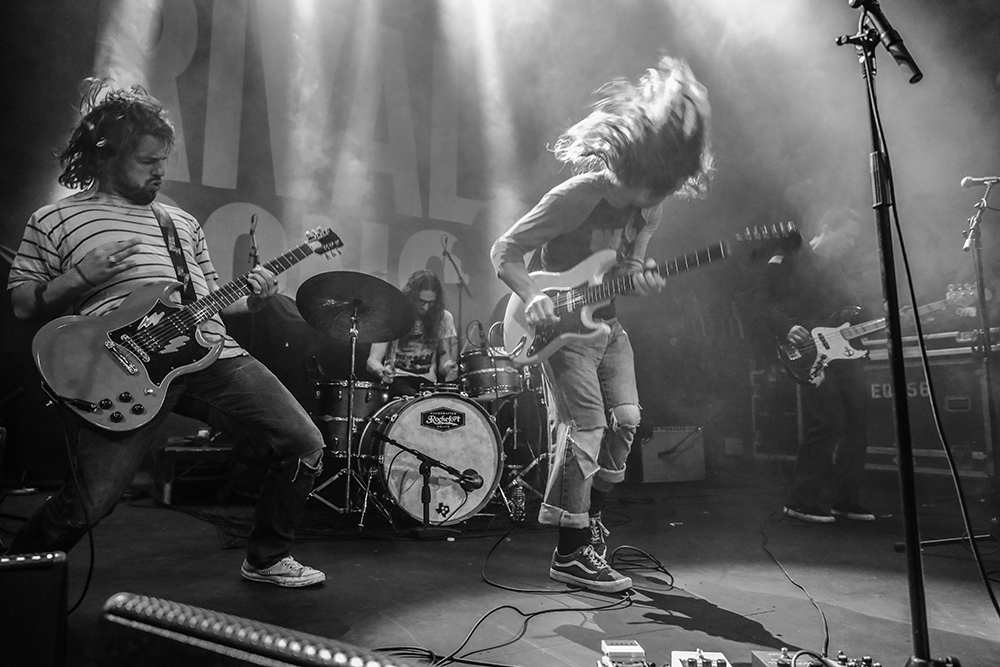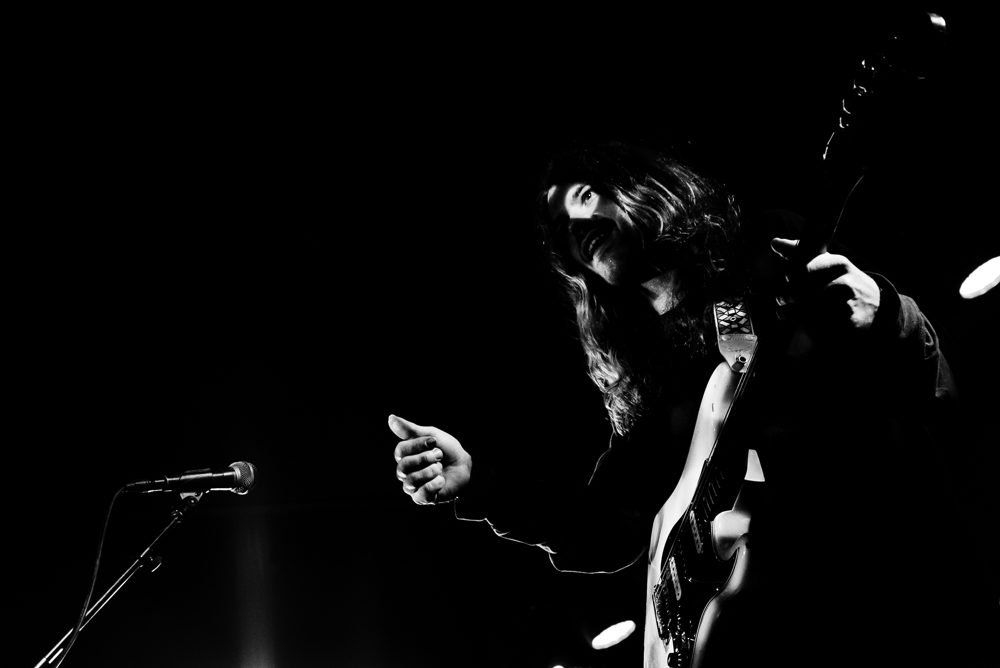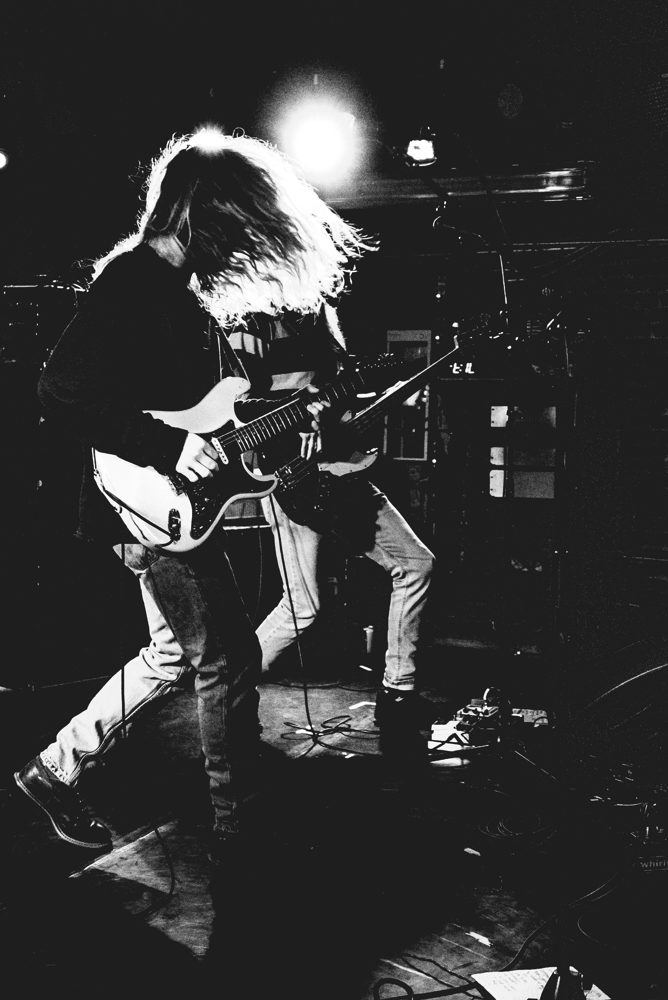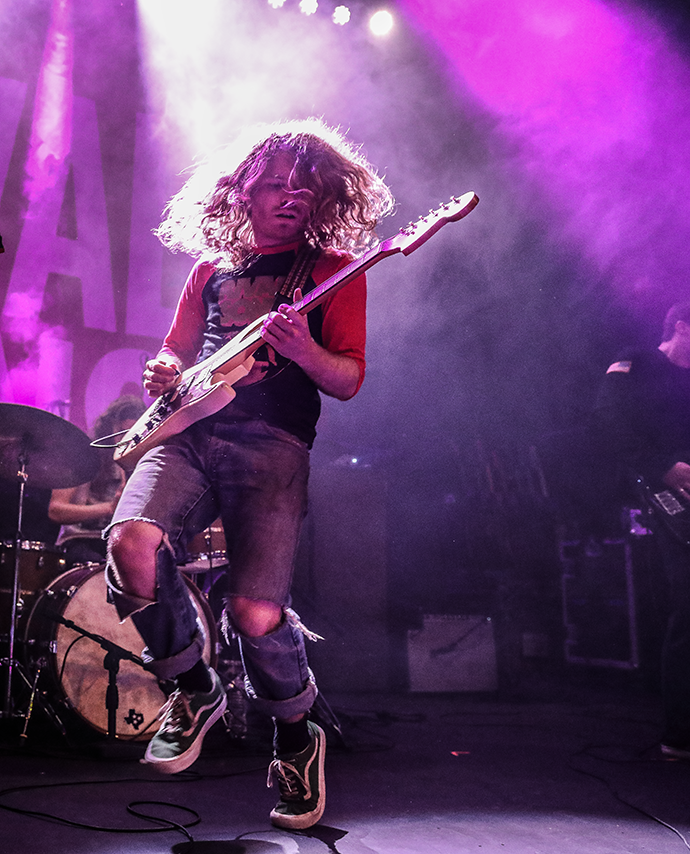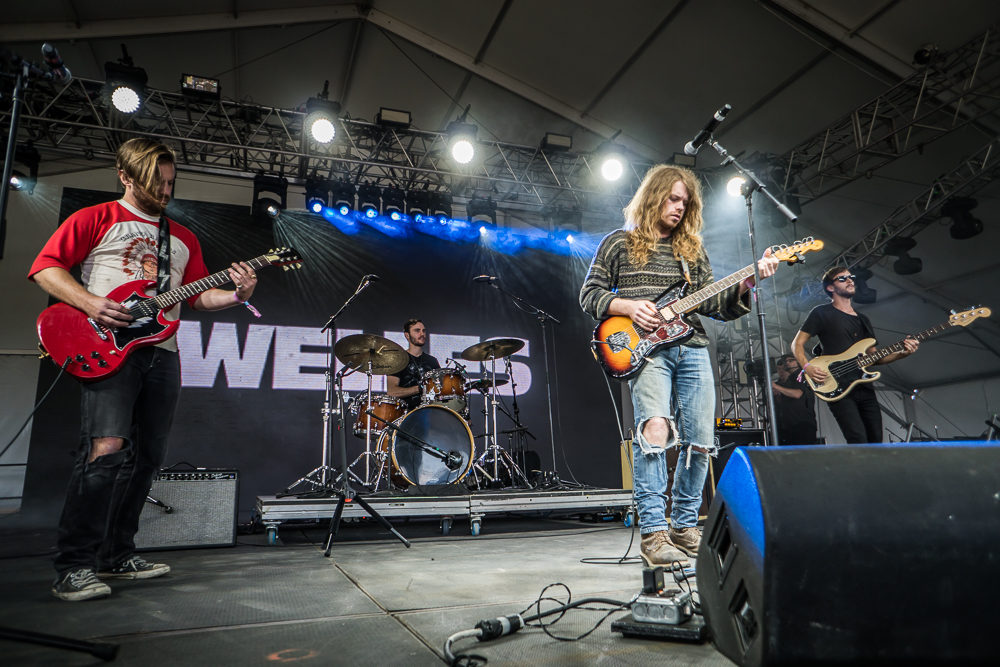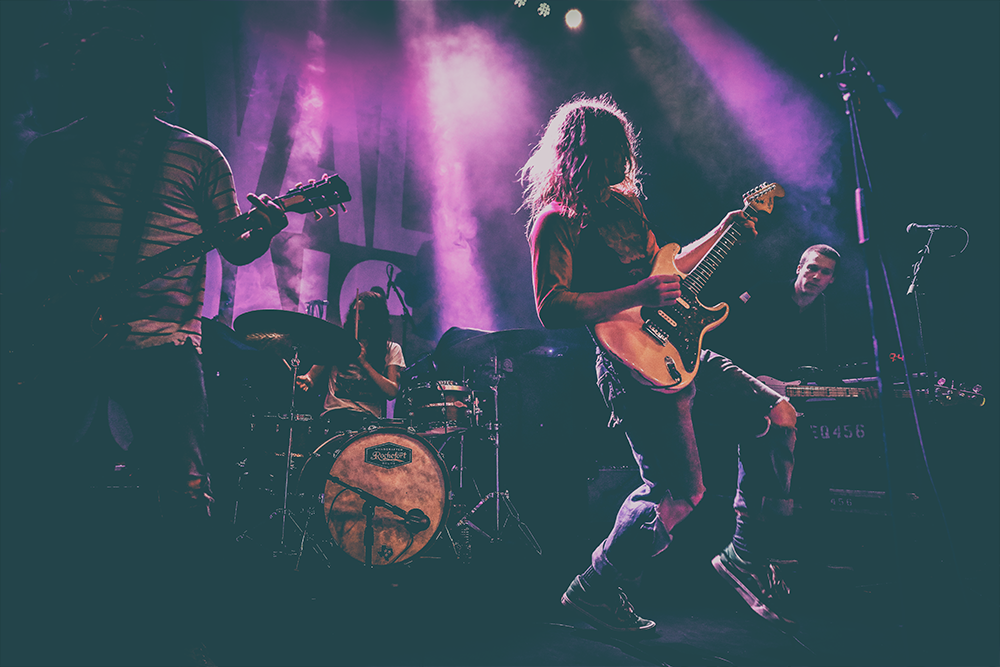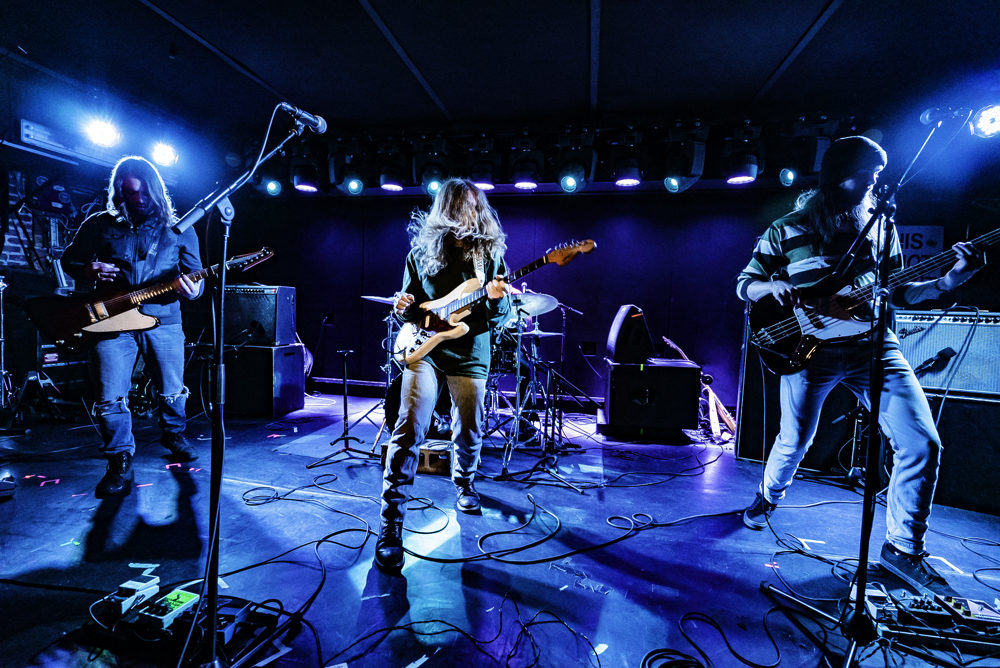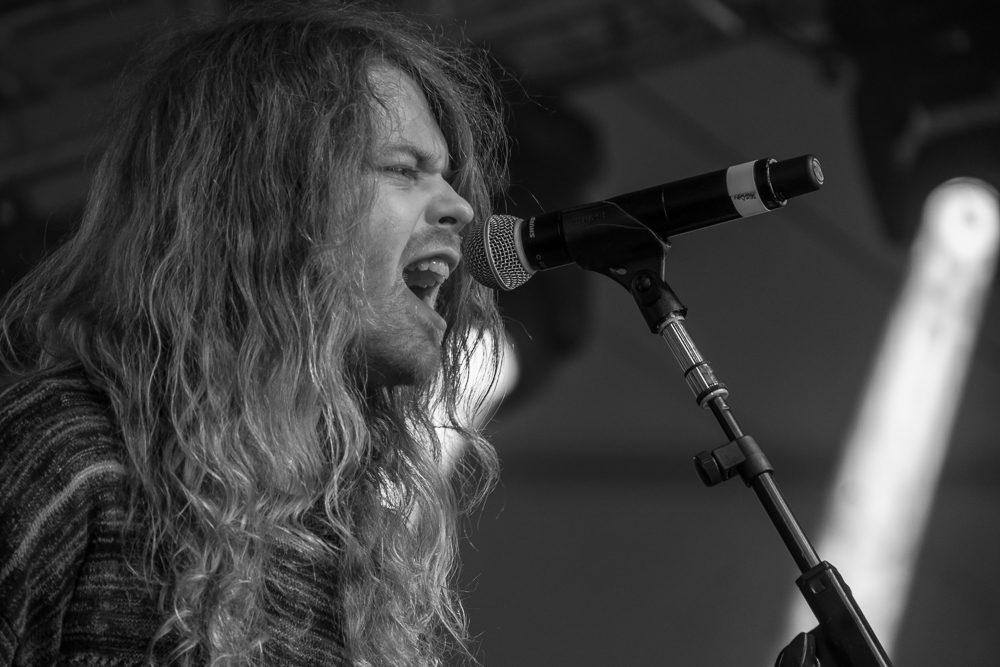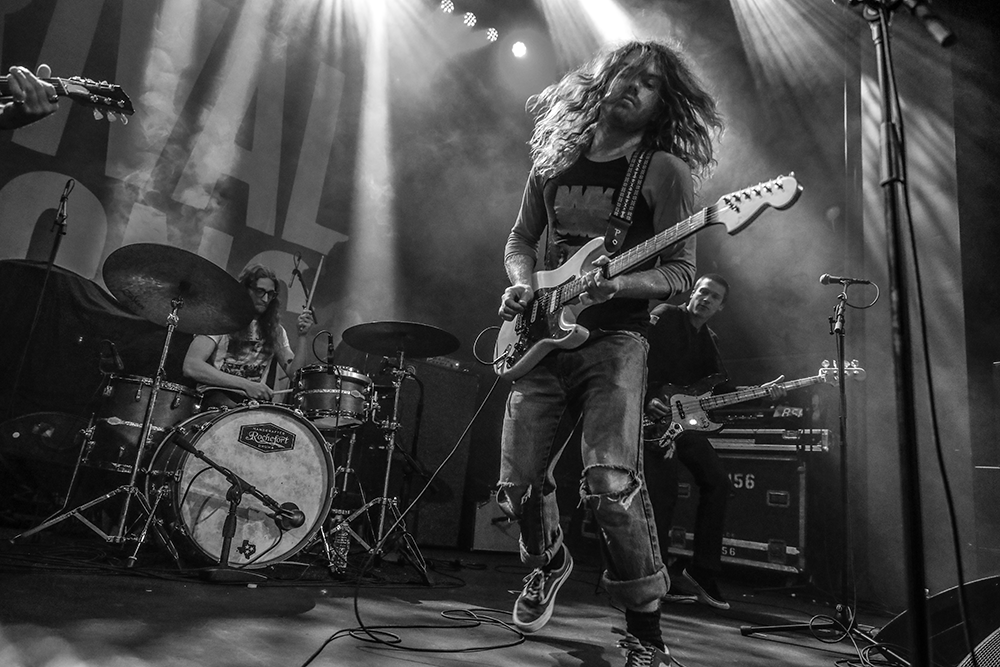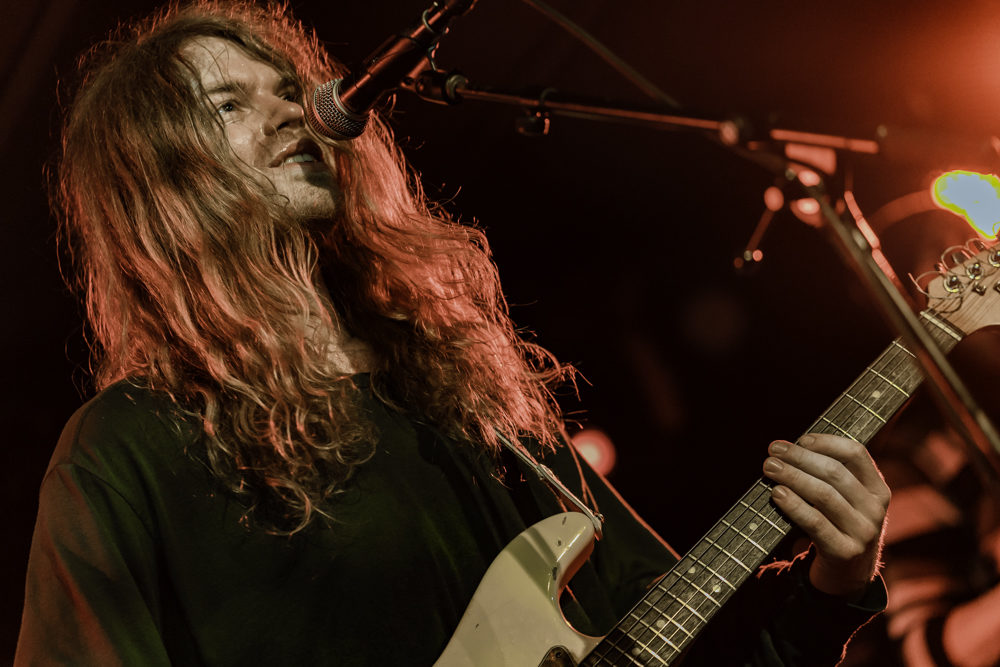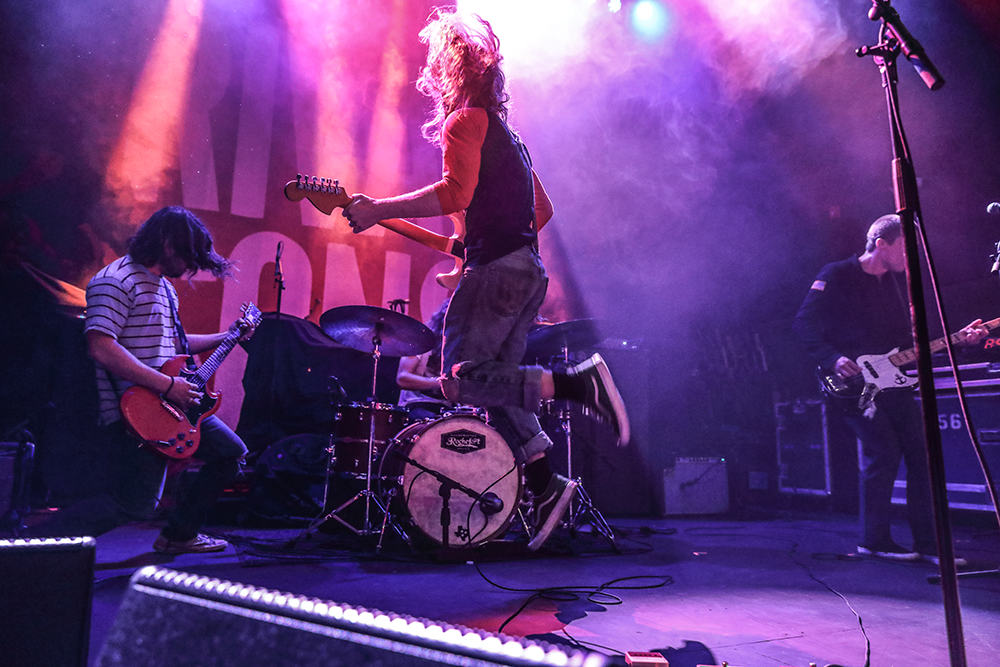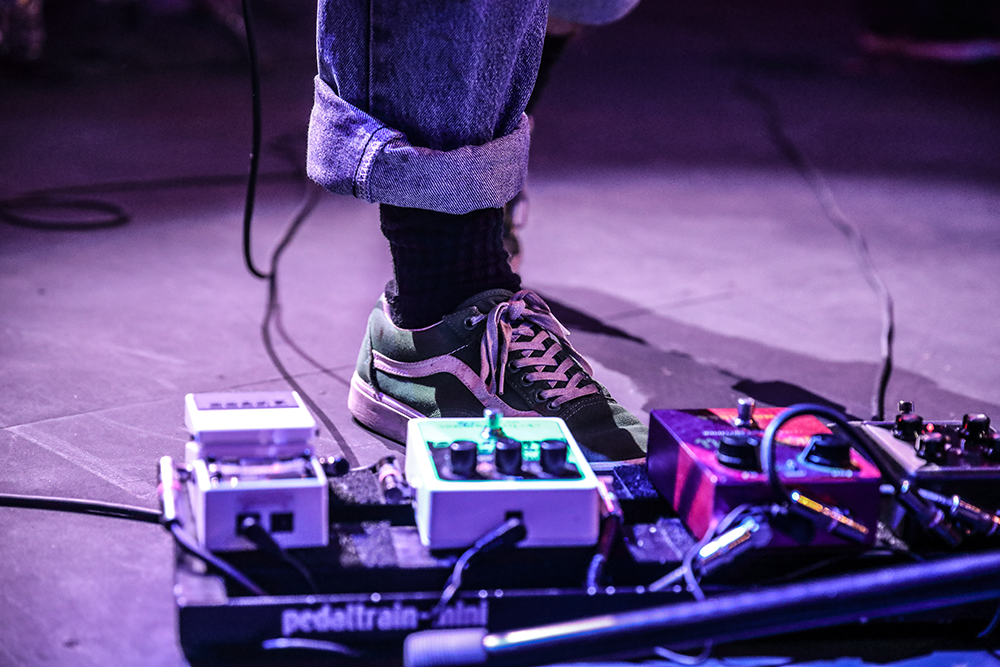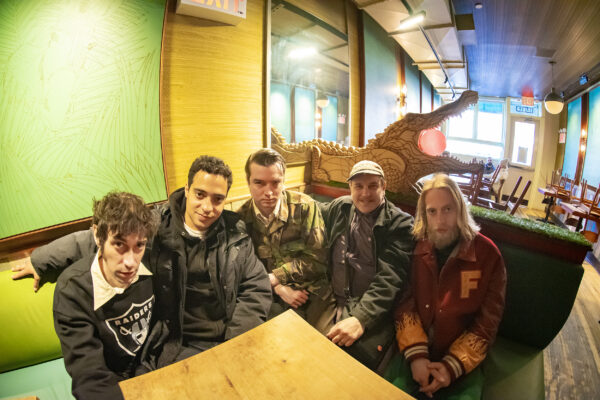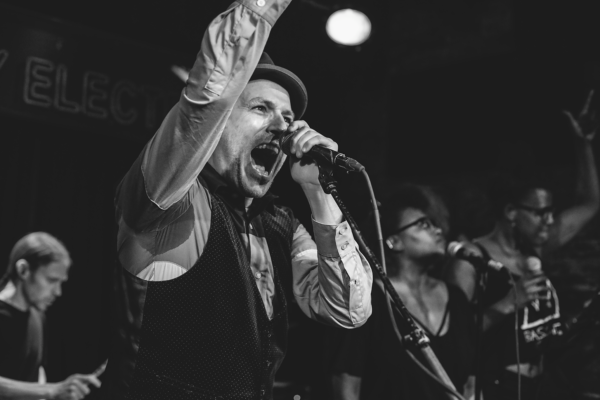Jesse Wells is the coolest paradox. The music of Welles is an intense storm of sound and emotion that steals all your attention, and the guy behind it is almost exactly the opposite – quiet, supremely relaxed, always a few words away from a joke, but just as happy to blend into the crowd and disappear if he can. When we caught up at Mercury Lounge before his latest NYC tour stop, Jesse was all smiles, wearing a mechanic-type suit (that would later be swapped out for jeans and a plain shirt for the show), his hair like a fortress around his shoulders as he led me downstairs. It was still hours before their set, and the whole underground space was empty, but he spoke at such a whisper that the subtle hum of the city above was suddenly competing.
I asked him something I’d wondered the times I’d seen him tear up some stages: what exactly is going through his head when he’s on stage creating such powerful music? If you’ve ever witnessed the scorching, shred-heavy magic of Welles’ live presence, his answer is probably not what you’d expect. “Trying to keep it light,” Jesse said without hesitation. “Honestly. A lot of times we’ll get done with ‘Seventeen’ and I’ll just say, ‘Wow, that was dramatic. Thanks for hanging on!’” he laughed, “and we’ll do the next thing. The tunes are so heavy that there’s absolutely no sense in brooding around. We’ve had twenty, thirty years of brooding, angry white males with long hair looking all hungover onstage, and it’s boring. I used to do stand-up and stuff back in Arkansas and I prefer to keep it light and tell a few jokes, and see if they can’t laugh. Nice and dry and fun; lighthearted, yeah. That’s what’s running through my head is like, ‘How can I even this out?” That’s exactly what happened later on, his straight-faced one-liners – like “When I was a kid, I had a dirt bike until my dad washed it” – stirring up laughter between Welles’ satisfying doses of adrenalizing rock.
Jesse elaborated on his point-of-view from the stage. “Sometimes, the words flow without thinking, and you nail it; and then other times, honestly, depending on the energy of the crowd, it’s a grind to get through. I’m not very excitable, but I am nervous,” he said openly. “I just avoid showing it. I’m vulnerable enough with all these tunes and these lyrics – I don’t want to give up any more than that. So I’ll play it cool; tell a few jokes and stuff.” Given the impact of his hard-rocking debut album, Red Trees and White Trashes, on the music world last year, I was curious if he had been back to his hometown of Ozark, Arkansas – which inspired the record – since it had been released. He had, and the reaction he received was right up his alley. “I think the people that knew me from the scene down there – like the guys who run the old radio station over there, and the venue and production guys and stuff like that – they remember me. And I see a post every once in a while on Facebook or something that they’re proud or whatever. But I don’t come back to mass adulation or anything, and honestly, I’m thankful for that, because that would be incredibly awkward to come back to my hometown and be treated differently than I was in high school. I’m still just the weird kid in town,” Jesse said contentedly.
“Any kid can make rock and roll, and it’s just so important that everybody knows that. It’s very important. It’s just…I don’t think that the way we live at the moment, the way the majority of us live, is very conducive to it. We don’t live very analog. And so if I could champion anything, it’s a more analog existence; one that does not care what is going on on the phone, or online, or anything like that. I’m somebody who can live in the moment and show people that it’s perfectly fine, and in fact, you’ll find yourself a lot more satisfied if you do. And I think that rock and roll is something that’s very much in the moment. And it requires your friends,” he grinned. “To start a band.” In fact, when asked if he could pass along anything at all to his listeners, Jesse said simply, “Go start a band. Get on it. You’ve already waited too long.”
On that topic, it was interesting to hear how he and his bandmates like to burn time on the road. “Last tour, I picked up a little 8-track recorder in Houston, Texas, and recorded the rest of the tour just in the backseat,” recalled Jesse. “It ran on batteries, so I got to learn how to use an 8-track, and then also record a bunch of tunes on it. Those were just kind of sound experiments, sound projects and stuff like that. I don’t think that we would ever hear any of that on a record. I don’t write a lot of music on the road, just poems and little stanzas and things like that, here and there. Sometimes a joke or two, because it’s just the four of us guys always hanging out and stuff, and we just laugh every day. We laugh all damn day. But what we have been doing is supplementing the set with songs that I’ve written since the album. Songs that may not have been necessarily approved for the next album, but I really believe in them and I’ll play them until I’m asked not to.” As promised, we were later treated to four killer new songs that did not appear on his latest record.
“There for a little while on the last tour, we were actually recording songs in the van,” Jesse added, describing how they pieced things together with a laptop and his phone. “We were tracking. I was sitting in the backseat with a bass guitar, or you know, with an electric guitar and I would record that. Then I’d stick the headphones on and record voice memos with the tune, and then send him the voice memos, and then he would mix them into the track, and that’s all we would do. And we didn’t have a microphone on us, so we just used the iPhone one. So we get to be creative in that way… The way I try to look at it is, by the time it’s time to record the next record, hopefully I have ten new songs. But if I was able to record a new record tomorrow, I would. And if we could do one the next day, we’d do another the next day. And if there was a third day to do it, then we’d record a third album. I mean, that’s all I want to do is put out music. I’m sitting on a lot of stuff that’s not necessarily earth-shattering, but it’s music all the same. And I think that our attention spans have been vastly diminished by scrolling through our phones constantly. And folks are in luck; I can cater to that. There’s a lot of tunes. You can hit it and quit it and go to the next one for all I care, just so long as I’m proliferating music – just getting it out there.”
This took me back to a memorable moment from our last interview, when Jesse described all the suitcases full of notebooks and hard drives full of ideas he had lying dormant, having written songs constantly since he was 12. He’s still “just piling it on,” as he put it. “I was actually fortunate enough to pull the old computer out of the attic and save 11 gigabytes worth of MP3 files from the years before onto an external hard drive. It took about 11 hours to do it, the computer was so slow. And as soon as I did that, it blue-screened and crashed. So that’s gone, but I saved it – I got it all. It was like 339 tunes, I think,” he said, confirming that they’re all unreleased. “There’s a ton of trash in there, but it’s my trash. And I still have all my old notebooks too.” We dove into the mechanics of his songwriting process. “The melodies will compel me to record, but there are always poems written and lyrics ready and set aside, so that whenever I do catch a melody in it – and you literally catch it – it’s out of the blue and then you have it. Then you can go and apply some of your lyrics to it, or write brand new ones.
“The songs get written in all different ways; there are songs that I’ll sit down and write on an acoustic guitar, like ‘Summer.’ I sit down with an acoustic guitar, and just as naturally as breathing, there’s your tune. And then you write the first few stanzas, and then figure out the tune for it, and then write a couple more, and then boom: there’s the song. The idea for that one [came first]. It was all about a big house party that I had gone to that just went haywire, but it was beautiful, you know? Just trashy.” he reminisced. “Other tunes start with a riff or a chord progression; ‘Codeine,’ for instance. I had just come off of that crap, and woke up just hot to trot and had quite a bit of coffee, and recorded that progression and then stepped out on the porch and had a cigarette or two, and then” – he made a fast noise akin to bullets firing – “wrote the lyrics, and then went in and laid down the vocal track, out of necessity.”
Given how clearly and completely the songs tend to hit him, I wondered if the final versions pressed into wax ever differ from his original recordings. “The production definitely does. My personal production is very different than what goes on in the studio,” Jesse said. “But other than that, the structure of the tunes more or less stays the same; maybe a little change here or there, but more or less is the same. There are tunes like ‘Rock N Roll’ where I went out and had coffee with my mom, and [wrote it] on the way back home. It took about five minutes to get home; I bolted up the stairs, and it was already done in my head. I ran down the lyrics, and what had I been listening to lately? I’d gotten ahold of The Slider by T. Rex (1972), and it was the first time I’d heard it, so I was incredibly blown away by it. So I said, ‘I’m incredibly inspired by this tune. I’ll do my best Slider, and then I’ll toss these lyrics on top of it.”
That honesty had impressed me on several occasions; Jesse’s never afraid to disclose the origins of his ideas, even if they’re rooted in someone else’s material – unlike so many artists who conceal such details. “I think it’s so exciting…” he took a deep breath mid-sentence, real exhilaration seeping through, “…and just gets me out of bed. I live at the peak of the culmination of all rock and roll. We have 50-60 years of rock and roll behind us, and I get to draw from all of it. And why not say, ‘I got this from that, and this from that, and this from that’? Because I did. Whether I want to admit or not or whether anyone else wants to admit it or not. You did. So we live with all of it. We’re blessed. The thing is, Cobain only had like…Lennon, and Bowie, and Dylan, and then some ‘80s artists that I’m not as familiar with. I get Cobain and Lennon, you know?” he said excitedly. “Why not use everything?”
Jesse was equally forthright about other aspects of the production process. “‘Rock N Roll,’ you know, the entire original chorus for it got ripped out, and I put something a bit simpler and grungier in, because I was advised and steered in that direction. I was challenged to write a more digestible chorus. So I spitballed a couple out there and one stuck.” I couldn’t help but ask if that kind of guidance bothered him, and he responded pleasantly in his still-hushed voice. “I don’t really work with anybody else in the demoing process whenever I’m doing it. I really do prefer to be alone – very alone – to do those sorts of things. I prefer not to have anybody around. But I think it’s probably more difficult for the people who ask me to change it. It’s more difficult for them than it is for me, because it’s like pulling teeth, and I have a lot of retorts, and a lot of smartass remarks as to why it’s perfect the way I did it – but it’s not fuckin’ perfect, and it doesn’t matter. You can’t eat a song. I’m trying to make a penny if at all possible,” he said, dipping into a funny tone on the topic of surviving. “And what’s better than being highly adaptable? I think that makes for a lot better artist.”
“I want to put out more music – a tune a day is what I want to try for – while I’m at home,” he said, listing the other artists who inspire him without being prompted. “I didn’t get to hear Mac DeMarco until his album had already been out a year, and then I was his biggest fan. I didn’t get to hear King Gizzard & the Lizard Wizard until they had several albums out, and I finally caught ‘em with I’m In Your Mind Fuzz and I was just sucked in. I’d love to get on the road with ol’ Stu,” Jesse said (the altered beast within me screaming), affirming that he enjoys the full spectrum of rock in his free time. “I listen to a lot of Ty Segall for production tricks and stuff like that. I think he’s a studio wizard, and I love his DIY approach. I love King Gizzard’s DIY approach and that definitely goes into my personal demos. As far as songwriting goes, it’s still candy pop from the ‘60s; it’s The Association, The Cowsills, The Beach Boys, The Beatles, and all that stuff. ‘Cause I just feel like, the art of the song; that’s really where it’s at. I think those are the peak forms of songs.”
Thinking of the way the music hits him, I asked where he felt most at peace to be able to write a song. “All around,” he said with a very relaxed expression. “A mix of both indoor and outdoor. I need to be able to step inside, of course, to record. But I’ll tell you what I need: I need the morning. I need the morning, because that’s when I work the best, between nine and eleven a.m. I’m just a cat that sits upright at like six am and is like ‘Christ! I’m still alive – now what?’ And I prefer my evenings to listen over whatever I’ve recorded and hang out with friends and stuff like that. But I need the morning. And a cup of coffee… The hardest part of touring is probably the anxiety; you’re just sitting in a van six to seven to eight to fourteen hours a day and you’re kind of stuck with your own thoughts, and you’re just bouncing between you and the screen and you know, you teach your mind to scroll, and then all of a sudden, you’re scrolling through your own thoughts – that’s no way to think.” Even with modern issues like these, Jesse greatly values how easy it is to put out music in this era. “I know there were a lot of brilliant bands in the ‘60s and ‘70s that simply didn’t have the means to record. I think of the people that I grew up around who taught me things on guitar and stuff back in Ozark, they were all in bands, and I can’t buy a single album of theirs, and they don’t even have a recording of their band, you know? And they played all through the ‘60s and ‘70s together in the bar scenes around there. Now – is it so inundated and saturated that your shit will inevitably probably not get listened to? Yuuup,” he said without a care in the world.
“We’re gonna jump in the studio here before too long, so ideally, there will be music released ASAP.” When I asked if that meant this year, Jesse said, “Hopefully, man! Hopefully. I had this idea for this Hell’s Welles, part one and part two – the first part is the softer and more Beatles-y tunes that I do, and then the second part is just a complete tear-down rip-out, just straight from the depths of hell; whatever I can summon up. And yeah, a freakin’ double LP is what I was shooting for. Now, is that gonna come to fruition? I don’t have high hopes for that. But that doesn’t mean I won’t try to die on that hill, because rock & roll belongs in albums. I know that singles make people more money and things like that, but rock & roll belongs in albums. I can’t think of my favorite rock & roll band’s EP.” Surprising me once more, he revealed another new concept that I never would have guessed.
“I’m also writing an album of ads for all the favorite things that I use. So I’ve written one for Sk8-Hi Pros Vans shoes; the label hooked me up with a couple pairs of those, and I hadn’t worn a tennis shoe in like seven years, and I put ‘em on and I was just like ‘Whoa…I’m quick. I’m agile,” he laughed. “And I’ve got one for this Casio Alarm Chrono watch,” he showed me the one on his wrist. “I like this watch. I’ve got one for Pall Mall cigarettes too.” When asked if he would ever pitch these songs as real ads and what he had planned, he replied matter-of-factly, “It’s a Lennon fetish. He garnered a lot of ideas and notions from the ads around him, and why would you not? They’re literally created to be earworms and to psychologically impact the public. So I’ll throw mine in – I’ll have a go at that. I enjoy it,” Jesse said, flashing another smile. “I enjoy making music and it takes the pressure off of it, because it’s not about me. It’s about the product, and it’s about making pop tunes; artfully-constructed pop tunes. I think, sometimes, people only like me when I’m bleeding, and I’m not always bleeding. Sometimes, I feel absolutely fantastic, and I want to tell people about my goddamned shoes.”
Article: Olivia Isenhart
Images: Shayne Hanley, Anthony Mulcahy & Bryan Lasky



